Mark David Gerson's Blog, page 4
September 18, 2015
"It's Never Too Late to Follow Your Dreams"
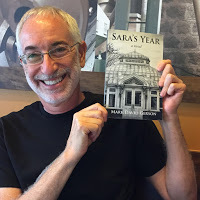 One of the first questions I asked myself, as I dealt with a series of health scares last year was, “If I’m to die sooner rather than later, what do I want to be sure I do before I go?” To my surprise the first response that bubbled up from somewhere deep within was, “Write another novel.” So, parking myself at a Santa Monica Starbucks (where else!?) a few weeks later, I switched on my laptop and began to write...even though I knew nothing of the story I was being called to.
One of the first questions I asked myself, as I dealt with a series of health scares last year was, “If I’m to die sooner rather than later, what do I want to be sure I do before I go?” To my surprise the first response that bubbled up from somewhere deep within was, “Write another novel.” So, parking myself at a Santa Monica Starbucks (where else!?) a few weeks later, I switched on my laptop and began to write...even though I knew nothing of the story I was being called to.Eight months and a different book later, I found myself back in Los Angeles, this time to sign books at the Conscious Life Expo. It was there on the second day of the event that a stranger marched up to my table, scrutinized me and my book display, and with a gaze of alarming intensity, asked me for my rising sign.
“Virgo,” I told him.
“When do you normally write?” he asked next.
There’s little you can call “normal” about my work habits. One draft or book might write itself more easily in the morning, another in the afternoon, another late at night. That’s what I told him.
“You need to be writing two hours before dawn,” he declared, backing it up with a complex astrological explanation that I pretended to understand.
“Not going to happen,” I muttered. I am barely functional two hours after dawn, let alone before. Yet when the next morning I awoke spontaneously at 4:30, I put my visitor’s theory to the test: I found the few pages of my barely started novel and continued where I had left off.
Through the months that followed that peculiar encounter (though rarely before dawn), Sara’s Year revealed itself to me with a speed and clarity that I had rarely before experienced in my writing, often through the meaningful coincidences that Carl Jung termed “synchronicities.” There were many – far too many to chronicle here – and each left me more in awe than the last.
Of course, I had many moments of resistance, as I often do when launching a new project. But as with every other of my books, I found ways to surrender to the greater wisdom of the story and, in so doing, write my way through and past my apprehension.
The result is a story I am profoundly grateful to have been chosen to write and one that has left all my advance readers clamoring for a sequel. It's also one that continues to remind me – as I hope it will also remind you – that it's never too late to follow your dreams!
Special Offer for My Blog Readers! Preorder your signed copy today, and start reading SARA'S YEAR before it hits bookstores! www.sarasyear.com
"Unlived dreams. Family secrets. Betrayal. And characters who haunt you long after you’re finished their story. You won't be able to put this book down!"– Karen Walker, author of The Wishing Steps
"A masterful journey with a brilliant cast of characters. What an adventure!"– Carolyn Flower, author of Gravitate 2 Gratitude
Published on September 18, 2015 18:56
July 30, 2015
Free Your Stories, Free Yourself!
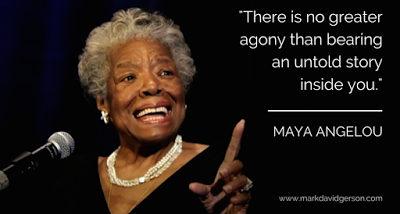 "There is no greater agony than bearing an untold story inside you."
"There is no greater agony than bearing an untold story inside you."– Maya Angelou
What stories are you carrying inside you that are yearning to be freed onto the page?
What stories are you carrying inside that, once freed onto the page, will also free you?
Whatever they are, write one of them. Now.
Write your story, and feel the healing freedom that all creative acts inspire.
• Need help getting going or keeping going? Look for my books and recording for writers, all designed to help you reawaken, access, experience and express your innate creativity! You'll find them online on Amazon and on all major ebook and music-download sites. And check out my free videos on YouTube.
Published on July 30, 2015 00:11
July 14, 2015
You Can Write!
 Close your eyes and remember. Remember the stories you invented... Remember wonder and imagination... Remember make-believe...
Close your eyes and remember. Remember the stories you invented... Remember wonder and imagination... Remember make-believe...You can write.
If you can read these words, you can write.
You're saying "I'm not creative" or "I can't make up stories" or "I don't know how."
Well, you are, you can and you do. And you can do it without struggle.
Whoever you are, whatever your background, whatever your education, you can write – in ways that bring meaning to your life, in ways that touch others.
The ability exists in all of us. We were born with it, with a unique voice, a unique way of seeing and describing the world, a unique palette of textures, images and hues with which to express what we feel, what we see, who we are.
As children we concocted imaginary places and playmates, soared with seagulls, raced with tigers. Close your eyes and remember. Remember the stories you invented. Remember wonder and imagination. Remember make-believe.
Watch your children, or your neighbor's children. Listen to the timeless stories they weave. We all crafted similar riches as children but, somehow, life got in the way. We grew more self-conscious. We were told not to make up stories. We feared being different. We were taught to write a certain way. We grew older, busier, more cautious. Slowly and without our being aware of it, the door to our creativity edged shut.
Now we wonder whether the key is lost for all time. It's not. That key remains within your grasp, always. It's your birthright. It's your story, your voice. And it has value.
There are many ways to unlock that door...
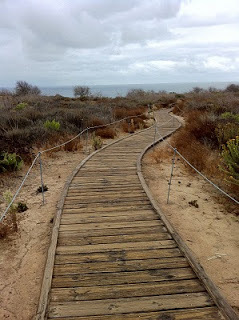
• Start by letting the child you were back into your life – not to displace the adult you've become, but to enrich it.
• Start asking how and why again.
• Slow down.
• Run your hand over a tree trunk.
• Inhale the perfume of an autumn evening.
• Get up early and watch the sun rise.
• Study people. See how they walk. Hear how they talk. Make up stories about them.
• Pretend you're on vacation and start a journal, recording your impressions of people and places as though seeing them for the first time.
Try writing for 15 minutes without stopping, without thinking, without editing. You'll be amazed at how much you can write in such a short time. You'll be amazed at how good it is. (I call that "writing on the Muse Stream.")
Don't censor yourself. Give yourself permission to write nonsense. Give yourself permission to begin without knowing where you're going. Writing is a voyage of discovery. Be open to the journey.
Look for books and groups that support your creativity, that let you tap into the writer you are. Find a quiet place and quiet time where you can write regularly. Find a quiet place within yourself.
Listen.
The stories are there.
• Need more help? Look for my books and recording for writers, all designed to help you reawaken, access, experience and express your innate creativity! You'll find them online on Amazon and on all major ebook and music-download sites. And check out my free videos on YouTube.
Photos: #1 Wikimedia Commons; #2 - Crystal Cove State Park by Mark David Gerson
Published on July 14, 2015 02:33
July 8, 2015
Dare to Feel. Dare to Connect.
 "Go to the emotional epicenter, where it hurts most, and write on. If you dare."
"Go to the emotional epicenter, where it hurts most, and write on. If you dare."~ Bill Donovan, editor/publisher, Creative Screenwriting
"Only connect."
~ E.M. Forster
The call to write is a call to share our emotional depth with others. It's a call to be vulnerable. It's a call to connect.
Thing is, we don’t touch others at a deep level when we connect mind-to-mind, though that connection is a powerful and important one. We touch others at a deep level when we connect heart-to-heart.
Unless we write from our deepest heart, unless we tell the stories that move us, we will never move our readers.
I spent the first chunk of my writing career avoiding writing from what Bill Donovan calls the "emotional eipcenter." I observed and reported, intellectually and dispassionately. I told stories, but without heart.
In not revealing my feelings (at times, not even to myself), I failed to engage my readers in any but superficial ways. I failed them and I failed myself.
I didn't connect.
 Do you want to write truth, the truth from which both powerful fiction and nonfiction arise? If you want to write truth, if you want to write words that will touch the deepest emotions and connections and truths of your reader, then you must write what your heart calls on you to write. You must go where you've never dared go before -- in your writing, certainly; in your life, perhaps.
Do you want to write truth, the truth from which both powerful fiction and nonfiction arise? If you want to write truth, if you want to write words that will touch the deepest emotions and connections and truths of your reader, then you must write what your heart calls on you to write. You must go where you've never dared go before -- in your writing, certainly; in your life, perhaps.You must, as I write in The Voice of the Muse's "Thirteen Rules for Writing," go for the jugular, for your jugular: "Go for the demon you would run from. Go for the feeling you would flee from. Go for that emotion you would deny. Once you put it on paper, you strip it of its power over you. Once you put it on paper, you free it to empower your work."
You free it, as well, to empower your readers. You empower them to feel their emotions, to be vulnerable and to share their stories.
"We tell our stories in order to live," Joan Didion writes in The White Album

We tell our stories, too, to connect.
There is neither life nor connection outside the heart.
• Where are you refusing to be vulnerable in your writing?
• Where are you afraid to reveal your feelings, perhaps even to yourself?
• In what ways are you reluctant to connect, heart-to-heart, with your readers?
• Where, right now, can you go for the jugular – your jugular – and dare to write from your emotional epicenter?
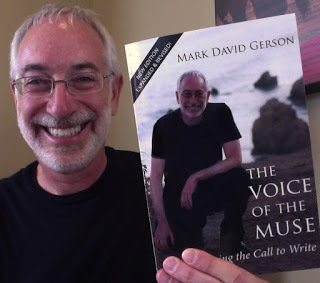 Adapted from The Voice of the Muse: Answering the Call to Write © Mark David Gerson
Adapted from The Voice of the Muse: Answering the Call to Write © Mark David GersonPart of answering the call to write and birthing the book that's inside you involves tapping into that emotional epicenter. That's some of the work I do as a writing/creativity/life coach. Need help getting there? Drop me a line.
Photo by Mark David Gerson: Tonopah, AZ
Published on July 08, 2015 07:05
June 30, 2015
It's Time to Stop Hating the Haters
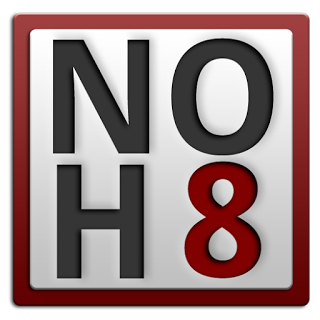 I don't often see the ignorant rantings of homophobic, misogynistic, antisemitic and islamophobic haters on my social media news feeds anymore – either because they have unfriended me or because I have ceased to follow them. But I'm disturbed to be seeing instead the hateful rants of people justifiably concerned about the blowback from the Supreme Court marriage equality ruling on Friday. Concern is justifiable. Even anger is justifiable. But when the hated start hating in return, we become no better than those who hate us. Sure, the pastor who threatened to burn himself to death if marriage equality became the law of the land and then didn't is a hypocrite, and he deserves to be mocked. He doesn't deserve to die or to be helped on his way. Mock, too, the Donald Trumps of the world who defend "traditional marriage" from the "sanctity" of their third marriage. But, again, we lose more than we gain when we attack these hypocrites with vicious language. What about county clerks whose deeply held religious convictions make it difficult for them to perform their license-issuing jobs? They ought to follow the lead of Juli Luke of Denton, TX, who told her local paper that "as an elected public official, my personal belief cannot prevent me from issuing the licenses as required." Those who choose, instead, to resign should be respected for the sincerity of their beliefs instead of being attacked or called names. But even those who choose to flout the law needn't be vilified with violent language. Criticize and mock them. Sue them. But stop the hate. The "NO H8" graphic doesn't specify who should and shouldn't be hated. While it refers to California's Prop 8, it doesn't state "it's not okay for you to hate me but it's fine for me to hate you." It just states, simply, eloquently and inclusively, "No Hate."Let's take the essence of that message to heart. Let's stop stooping to the haters' level. Let's end all bigotry, not just bigotry directed toward us. Let's demonstrate that hate, however it's expressed and whoever expresses it, is destructive. Let's remember that hate has consequences. Always.
I don't often see the ignorant rantings of homophobic, misogynistic, antisemitic and islamophobic haters on my social media news feeds anymore – either because they have unfriended me or because I have ceased to follow them. But I'm disturbed to be seeing instead the hateful rants of people justifiably concerned about the blowback from the Supreme Court marriage equality ruling on Friday. Concern is justifiable. Even anger is justifiable. But when the hated start hating in return, we become no better than those who hate us. Sure, the pastor who threatened to burn himself to death if marriage equality became the law of the land and then didn't is a hypocrite, and he deserves to be mocked. He doesn't deserve to die or to be helped on his way. Mock, too, the Donald Trumps of the world who defend "traditional marriage" from the "sanctity" of their third marriage. But, again, we lose more than we gain when we attack these hypocrites with vicious language. What about county clerks whose deeply held religious convictions make it difficult for them to perform their license-issuing jobs? They ought to follow the lead of Juli Luke of Denton, TX, who told her local paper that "as an elected public official, my personal belief cannot prevent me from issuing the licenses as required." Those who choose, instead, to resign should be respected for the sincerity of their beliefs instead of being attacked or called names. But even those who choose to flout the law needn't be vilified with violent language. Criticize and mock them. Sue them. But stop the hate. The "NO H8" graphic doesn't specify who should and shouldn't be hated. While it refers to California's Prop 8, it doesn't state "it's not okay for you to hate me but it's fine for me to hate you." It just states, simply, eloquently and inclusively, "No Hate."Let's take the essence of that message to heart. Let's stop stooping to the haters' level. Let's end all bigotry, not just bigotry directed toward us. Let's demonstrate that hate, however it's expressed and whoever expresses it, is destructive. Let's remember that hate has consequences. Always.
Published on June 30, 2015 09:10
June 21, 2015
For Father's Day: A Tale of Love &Reconciliation
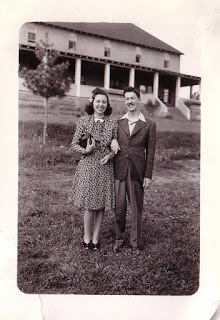 Few of the stories I share about my father in Acts of Surrender: A Writer's Memoir are flattering. Physically and emotionally absent in my early childhood and dead before my 14th birthday, Sydney Gerson was not the kind of parental figure one thinks of as, well, much of a parental figure.
Few of the stories I share about my father in Acts of Surrender: A Writer's Memoir are flattering. Physically and emotionally absent in my early childhood and dead before my 14th birthday, Sydney Gerson was not the kind of parental figure one thinks of as, well, much of a parental figure. On top of that, it turns out that he was probably not my natural father, something I learned long after all the principals in that drama – him, my mother and my natural father – had passed away (another story I tell in Acts of Surrender).
And yet I carry his name, and of the three fathers I have experienced in my life, he is the only one I ever think of as "Daddy."
So on this Father's Day, nearly a half-century after his death, I share this tale of love and reconciliation, adapted from Acts of Surrender...
It's August 11, 1997. After nearly two months of full-time road travel, Roxy (my cocker spaniel) and I check into the Shilo Inn in Boise, Idaho. Once I get Roxy situated, I change into my bathing suit and settle into the white-tiled steam room that is a fixture in many of the chain’s properties.
 I have no plans, other than to shut my eyes and relax into the steam. But after a few minutes, I feel another presence in the room. I open my eyes and peer through the clouds of steam. I see no one.
I have no plans, other than to shut my eyes and relax into the steam. But after a few minutes, I feel another presence in the room. I open my eyes and peer through the clouds of steam. I see no one.“Hello?”
No answer.
I close my eyes again. Immediately, I sense a white-robed man staring at me from across the room. He is tall, dark-haired, with a trim beard and mustache and a muscular build. A gold coronet rests on his head.
“Who are you?” I ask silently.
“My name is Arctur,” I sense rather than hear.
“Right,” I think dismissively. My mind is playing tricks on me.
“This is no trick. I am Arctur,” he repeats.
A silent conversation ensues, but for how long I cannot say. Time has no meaning among the mystical swirls of steam.
“There is someone here who wants to speak with you,” Arctur says after a while.
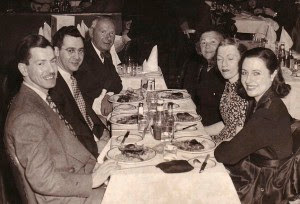 I wait.
I wait.“Because this is so close to the anniversary of your father’s death...”
Suddenly I sense my father’s presence. My heart starts to race.
“I’m sorry I couldn’t be the father you wanted me to be,” I hear my father say. “I’m sorry I couldn’t be there for you in all the ways you deserved.”
I begin to sob.
“But I loved you and still love you,” he continues. “And I’m so proud of what you are doing and who you are becoming. I couldn’t be a role model for you, but you are now a role model for me. I’m watching you. I’m with you. I’m learning from you. Thank you.”
Moments later, still crying, I sense that Arctur and my father have left. I open my eyes. The steam room is empty. I wipe my face, collect myself and return to my room.
How close to the anniversary is it? I fire up my laptop and open my file of significant dates.
As close as it can be. My father died 29 years today — August 11, 1968.
Adapted from Acts of Surrender: A Writer's Memoir © Mark David Gerson
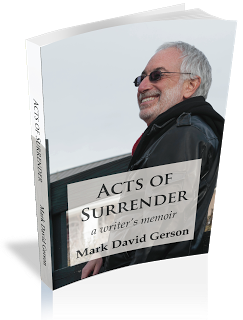
• • • Get your copy of Acts of Surrender today – on most Amazon sites, from select other online booksellers, from my website (signed to you, while supplies last) or from your favorite ebook store
• • I share a different kind of Father's Day story – this time I'm the father – in this Acts of Surrender excerpt on video: "Guinevere, My Daughter" – https://youtu.be/M-1vgCCj_04.
• Photos (long before I was born) – My parents, around 1940 or 1941, and a family gathering in the later 1940s
Published on June 21, 2015 04:55
For Father's Day: A Tale of Reconciliation & Love
 Few of the stories I share about my father in Acts of Surrender: A Writer's Memoir are flattering. Physically and emotionally absent in my early childhood and dead before my 14th birthday, Sydney Gerson was not the kind of parental figure one thinks of as, well, much of a parental figure.
Few of the stories I share about my father in Acts of Surrender: A Writer's Memoir are flattering. Physically and emotionally absent in my early childhood and dead before my 14th birthday, Sydney Gerson was not the kind of parental figure one thinks of as, well, much of a parental figure. On top of that, it turns out that he was probably not my natural father, something I learned long after all the principals in that drama – him, my mother and my natural father – had passed away (another story I tell in Acts of Surrender).
And yet I carry his name, and of the three fathers I have experienced in my life, he is the only one I ever think of as "Daddy."
So on this Father's Day, nearly a half-century after his death, I share this tale of love and reconciliation, adapted from Acts of Surrender...
It's August 11, 1997. After nearly two months of full-time road travel, Roxy (my cocker spaniel) and I check into the Shilo Inn in Boise, Idaho. Once I get Roxy situated, I change into my bathing suit and settle into the white-tiled steam room that is a fixture in many of the chain’s properties.
 I have no plans, other than to shut my eyes and relax into the steam. But after a few minutes, I feel another presence in the room. I open my eyes and peer through the clouds of steam. I see no one.
I have no plans, other than to shut my eyes and relax into the steam. But after a few minutes, I feel another presence in the room. I open my eyes and peer through the clouds of steam. I see no one.“Hello?”
No answer.
I close my eyes again. Immediately, I sense a white-robed man staring at me from across the room. He is tall, dark-haired, with a trim beard and mustache and a muscular build. A gold coronet rests on his head.
“Who are you?” I ask silently.
“My name is Arctur,” I sense rather than hear.
“Right,” I think dismissively. My mind is playing tricks on me.
“This is no trick. I am Arctur,” he repeats.
A silent conversation ensues, but for how long I cannot say. Time has no meaning among the mystical swirls of steam.
“There is someone here who wants to speak with you,” Arctur says after a while.
 I wait.
I wait.“Because this is so close to the anniversary of your father’s death...”
Suddenly I sense my father’s presence. My heart starts to race.
“I’m sorry I couldn’t be the father you wanted me to be,” I hear my father say. “I’m sorry I couldn’t be there for you in all the ways you deserved.”
I begin to sob.
“But I loved you and still love you,” he continues. “And I’m so proud of what you are doing and who you are becoming. I couldn’t be a role model for you, but you are now a role model for me. I’m watching you. I’m with you. I’m learning from you. Thank you.”
Moments later, still crying, I sense that Arctur and my father have left. I open my eyes. The steam room is empty. I wipe my face, collect myself and return to my room.
How close to the anniversary is it? I fire up my laptop and open my file of significant dates.
As close as it can be. My father died 29 years today — August 11, 1968.
Adapted from Acts of Surrender: A Writer's Memoir © Mark David Gerson

• • • Get your copy of Acts of Surrender today – on most Amazon sites, from select other online booksellers, from my website (signed to you, while supplies last) or from your favorite ebook store
• • I share a different kind of Father's Day story – this time I'm the father – in this Acts of Surrender excerpt on video: "Guinevere, My Daughter" – https://youtu.be/M-1vgCCj_04.
• Photos (long before I was born) – My parents, around 1940 or 1941, and a family gathering in the later 1940s
Published on June 21, 2015 04:55
June 9, 2015
Your Story, Your Life
 "What you have lived is unique. What you have learned through your years of living is beyond price. And the value of all you share through your words, and of all the ways you awaken and grow through your words, is incalculable."
"What you have lived is unique. What you have learned through your years of living is beyond price. And the value of all you share through your words, and of all the ways you awaken and grow through your words, is incalculable."– From Memory to Memoir: Writing the Stories of Your Life
You are a storyteller — not because you are unusual (though your experiences may well be), but because we are all storytellers. We each carry an infinite potential for self-expression-through-story that, if we open to it, can reshape our lives and the lives of others in ways we cannot begin to imagine.
In a sense, we are also all memoirists. From the moment the first caveman returned from a day’s hunting and grunted his experiences to his mates over the cooking fire, we have been not only telling stories, but telling our story. From the moment of our first newborn gurgle, we have been communicating something of our brief life. From the moment the first diary entry reflected back on days, months or years past, we have been unconsciously crafting memoir.
Yet writing a memoir involves more than reciting dates, facts and what-happened-next’s. A memoir is an intimate journey into what underlies those dates, facts and occurrences.
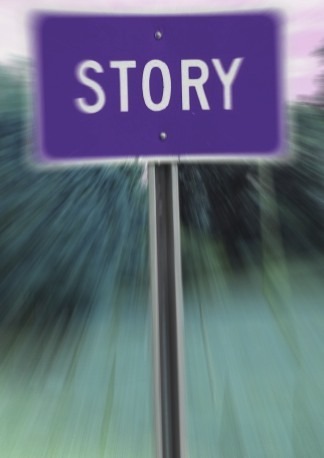 A memoir is also not autobiography. Autobiographies are vast and encyclopedic. Even should it span your life from conception until last week, a memoir is both more subjective and less comprehensive than any autobiography. Like an Impressionist painting, it includes more shade and texture than detail, more personality than panorama.
A memoir is also not autobiography. Autobiographies are vast and encyclopedic. Even should it span your life from conception until last week, a memoir is both more subjective and less comprehensive than any autobiography. Like an Impressionist painting, it includes more shade and texture than detail, more personality than panorama.Nor is a memoir simply a published journal. While it may draw on your journals and may even quote from them, a memoir is more focused and less self-indulgent. It’s a story built, however unconsciously, around a theme. It’s a story that transforms the personal into the universal. It’s a recounting of your experiences that transcends your experiences. It’s a story designed to be shared.
Perhaps you have come to this book willingly — in order to leave a legacy for your children or grandchildren. Perhaps you hope to communicate your story to a larger audience — to strangers, as well as to family and friends. Or perhaps you come to this memoir-writing journey, as I did to mine, reluctantly, doubtfully, skeptically. Perhaps you don’t believe you have stories worth sharing, stories that others would want to read, stories with the potential to inspire. Of course you do. We all do.
 Here’s the thing: What you have lived is unique. What you have learned through your years of living is beyond price. And the value of all you share through your words, and of all the ways you awaken and grow through your words, is incalculable.
Here’s the thing: What you have lived is unique. What you have learned through your years of living is beyond price. And the value of all you share through your words, and of all the ways you awaken and grow through your words, is incalculable.It’s true for you. It’s true for me. It’s true for everyone.
"It doesn’t matter whether you are eager or resistant, overflowing with anecdotes or unsure where to find yours. Whoever you are, whatever your experiences, whatever your perceived writing ability, From Memory to Memoir will connect you with the stories you remember and, perhaps even more important, with the stories you have forgotten...with the stories you are keen to tell and, perhaps even more powerfully, with the stories you are reluctant to reveal. It will serve up the inspiration guaranteed to get you writing and keep you writing, the tools and techniques guaranteed to help you craft a rich, compelling narrative, and the support guaranteed to sustain you from the initial word of your book’s first draft to the final word of its ultimate draft.
That’s why you are here. That’s why I am here.
So what are you waiting for? Turn the page and join me on this adventure of a lifetime...this journey into the experience of your own creativity as, together, we write the stories of your life.
Excerpted from
From Memory to Memoir: Writing the Stories of Your Life
 © Mark David Gerson All Rights Reserved
© Mark David Gerson All Rights Reserved
Get your copy of From Memory to Memoir today -- on most Amazon sites and in Kindle, iBook, Google Play, Kobo + Nook stores worldwide
Photos: © Mark David Gerson
Published on June 09, 2015 15:53
May 27, 2015
Only You Can Write the Story That's Yours to Write
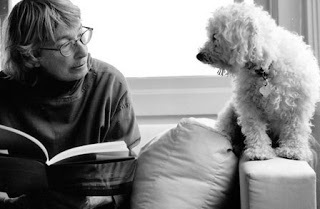 One day you finally knew
One day you finally knewwhat you had to do, and began,
though the voices around you
kept shouting
their bad advice...
– Mary Oliver, from her poem "The Journey," collected in Dream Work
Only you can write the story that's yours to write. And write it you must, regardless of the voices, inner and outer, that cry out for you to stop, that claim they're trying to save you.
There is no salvation in stopping, in turning away, in listening to those voices, however sensible they seem.
Your only salvation is the word that must emerge from the prison of your fear and into the light of your potential. This word, and now this one. And now this one.
One word following the next and the next, crashing through what you think you know -- about yourself and the world -- and carrying you into the Kingdom of the New, that wondrous realm beyond your imagining that has been waiting for you since the beginning of time.
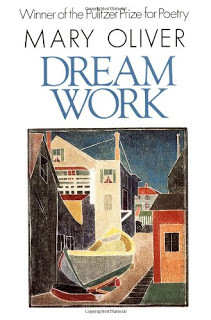 But little by little,
But little by little,as you left their voices behind,
the stars began to burn
through the sheets of clouds,
and there was a new voice
which you slowly
recognized as your own,
that kept you company
as you strode deeper and deeper
into the world,
determined to do
the only thing you could do...
~ "The Journey"
Only you can write the story that's yours to write. Have you begun? If so, it's time to continue. If not, close this browser window and begun. How? With one word. Any word. And then with another...and another...and another...one word following the next until the story is done.
Need help, motivation or inspiration?
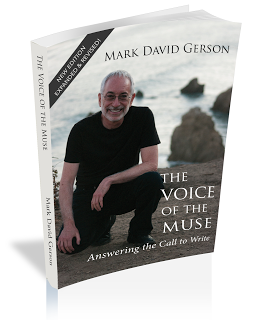
• Pick up one of my books for writers in paperback on most Amazon sites, from select other online booksellers or from my website, or download the ebook from any major ebook seller.
• Looking for more personalized attention? Drop me a line to learn more about more one-on-one services for writers.
Published on May 27, 2015 20:50
May 10, 2015
You Know You're Writing the Right Story When...
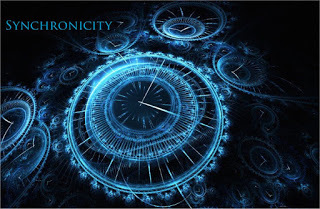 synchronicity (n) The simultaneous occurrence of events that appear significantly related but have no discernible causal connection. Meaningful coincidence. Used especially in the psychology of C. G. Jung.
synchronicity (n) The simultaneous occurrence of events that appear significantly related but have no discernible causal connection. Meaningful coincidence. Used especially in the psychology of C. G. Jung.More than any other writing project I have tackled, Sara's Year, my new story-in-progress, has bombarded me with so many meaningful coincidences that my once-mighty resistance to this novel-plus-screenplay has pretty much crumbled.
 In case you missed my recent posts about the project, here as well as on Facebook and Google+, here's a recap...
In case you missed my recent posts about the project, here as well as on Facebook and Google+, here's a recap...Sara's Year is set in Montreal over a 50-year period between the 1930s and the 1980s, with a brief but significant episode in postwar Halifax. Not only is this story more directly autobiographical than anything I have ever written (other than my Acts of Surrender memoir, of course), it's also more creatively challenging than anything I have ever attempted. In addition, it involves considerable research because of its real-life setting and one real-life character.
Given all that, it's no wonder I was so hesitant when my Muse came knocking at my door! It didn't help that the first scene I wrote veered in such an unexpected direction that it was eight months before I returned to the manuscript. More accurately stated, I was nudged back to the manuscript by the first in a long and still-unfolding series of synchronistic events that eloquently and unequivocally demonstrated that this was my story to write...so I'd better get on with it!
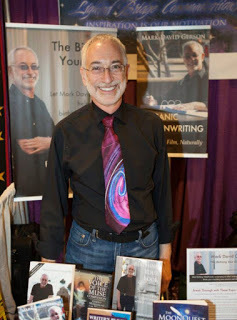 It all began a year ago when, facing a series of health scares, I asked myself: "If I'm going to die sooner rather than later, what is it that I want to make sure I do and/or experience before I go?" To my surprise, the first answer that bubbled up from deep within was "write another novel." Soon after, with a vague sense of the story and a working title, I launched Sara's Year in a Santa Monica Starbucks.
It all began a year ago when, facing a series of health scares, I asked myself: "If I'm going to die sooner rather than later, what is it that I want to make sure I do and/or experience before I go?" To my surprise, the first answer that bubbled up from deep within was "write another novel." Soon after, with a vague sense of the story and a working title, I launched Sara's Year in a Santa Monica Starbucks.Eight months later, I was signing books at the Lighted Bridge Communications booth at the Conscious Life Expo in L.A. when a man walked up to my table and, with a gaze of almost alarming intensity, asked me for my rising sign. "You need to be writing two hours before dawn," he proclaimed when I answered "Virgo." The next morning I woke up unexpectedly early and returned to Sara's Year, although any thought of a consistent predawn writing routine quickly evaporated.
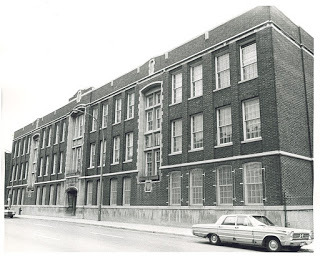 After one of my first Facebook posts about the project, referencing Montreal's legendary Baron Byng High School (many well-known Canadian cultural and political luminaries were graduates, as was my mother; even William Shatner attended for a time), my sister messaged me. Did I know about the famous student murals at Baron Byng? Our mother's signature was on at least one.
After one of my first Facebook posts about the project, referencing Montreal's legendary Baron Byng High School (many well-known Canadian cultural and political luminaries were graduates, as was my mother; even William Shatner attended for a time), my sister messaged me. Did I know about the famous student murals at Baron Byng? Our mother's signature was on at least one.No, I hadn't known. But a Google search turned up a 66-year-old article about the murals and about Anne Savage, the longtime Baron Byng art teacher and well-known Canadian artist under whose tutelage they were created. That day, Savage became a key secondary character in Sara's Year, my fictional pseudo-Baron Byng was replaced by the real thing and my version of the school's student murals became part of the story.
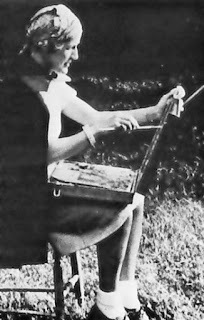 There have been too many Anne Savage synchronicities to chronicle in this post, but here are a few...
There have been too many Anne Savage synchronicities to chronicle in this post, but here are a few...• I was out for a walk one day when it occurred to me that one of my best friends in high school might have had an Anne Savage connection through his mother. Ann Peterson was Art Supervisor for the same Montreal school board as had been Savage after she left Baron Byng. "Anne Savage was my mother's mentor," Greg wrote me. "She was really responsible for getting my mother the job."
• One of Anne Savage's artist colleagues and friends was Arthur Lismer, for three years principal of Halifax's Victoria School of Art and Design. By the time I discovered this, the school was already playing an important role in Sara's Year. (By that point in its history and my story's chronology, the school had been renamed the Nova Scotia College of Art (it's now NSCAD University).
• When I needed an excuse for one of my characters, an NSCAD professor and Anne Savage fan, to find himself in Montreal in 1956, I discovered that Savage had a one-woman show in the city that year. Perfect!
Which brings me to the many Halifax/NSCAD/Anna Leonowen synchronicities. Here's a sampling...
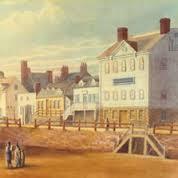 • I was researching NSCAD to make sure it was around in 1946, only to discover that it was founded in the late 19th century by Anna Leonowens (the real-life Anna of The King and I). Once I discovered that the original Anna and the King of Siam movie premiered in 1946 and that The King and I musical premiered 10 years later (again, perfect timing for events that needed to play out in both those years), the two films (and Anna herself) became key elements in the story.
• I was researching NSCAD to make sure it was around in 1946, only to discover that it was founded in the late 19th century by Anna Leonowens (the real-life Anna of The King and I). Once I discovered that the original Anna and the King of Siam movie premiered in 1946 and that The King and I musical premiered 10 years later (again, perfect timing for events that needed to play out in both those years), the two films (and Anna herself) became key elements in the story.• On a side note, I also discovered that post-Siam Anna not only lived in Halifax, she died and was buried in Montreal.
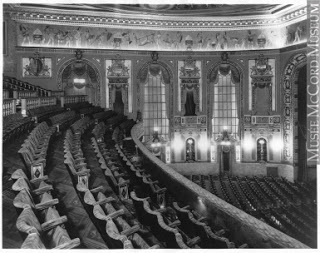 • While I was waiting for my team of volunteer researchers to find out for me when and where those films premiered in Halifax (the original film) and Montreal (the musical), I placed them in the theaters that would best serve the geography of the story: Anna and the King at the Capitol and The King and I at the Palace. When the research results came in, I discovered that the films had, in fact, premiered in those theaters.
• While I was waiting for my team of volunteer researchers to find out for me when and where those films premiered in Halifax (the original film) and Montreal (the musical), I placed them in the theaters that would best serve the geography of the story: Anna and the King at the Capitol and The King and I at the Palace. When the research results came in, I discovered that the films had, in fact, premiered in those theaters.• The King and I opened at the Palace in Montreal exactly 27 years before the day I had already selected as the relevant character's funeral, an anniversary that also now plays into the story.
• In my nearly 18 years living in the U.S., I have never knowingly met anyone from Nova Scotia. One morning, about halfway through the first draft of the novel, I attended a workshop at the Apple Store. One of my fellow participants introduced himself as a Halifax native!
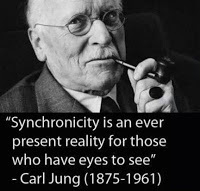 Where is Sara's Year today? I finished a first draft of the novel last week and am about a dozen pages into a first draft of the screenplay. Meantime, those "meaningful coincidences" keep showing up, which is just as well: Every time I feel discouraged about the project (often) or doubtful about my ability to carry it off (even more often), another synchronicity presents itself to remind me that I am writing the right story!
Where is Sara's Year today? I finished a first draft of the novel last week and am about a dozen pages into a first draft of the screenplay. Meantime, those "meaningful coincidences" keep showing up, which is just as well: Every time I feel discouraged about the project (often) or doubtful about my ability to carry it off (even more often), another synchronicity presents itself to remind me that I am writing the right story!• What about you? What synchronicities have shown up in your life recently, whether as part of your creative life or not ? Post your story as a comment on the original blog piece.
Photos
#1 – This prototype cover featuring an image of Montreal's distinctive staircases is only being used to keep me inspired as I move forward with the project. It is not the final cover. (Credit: https://hammerphotography.wordpress.com)
#2 – Me at the Conscious Life Expo, February 2015 (Credit: www.marlenaelise.com)
#3 – Baron Byng High School
#4 – Artist Anne Savage
#5 – Now Halifax's Five Fishermen restaurant, this building was home to the Nova Scotia College of Art during Sara's Year
#6 – Montreal Palace Theatre (Credit: McCord Museum)
Published on May 10, 2015 16:11



